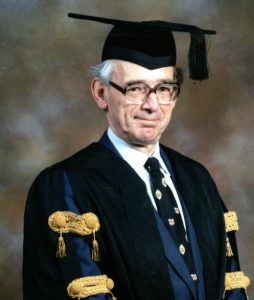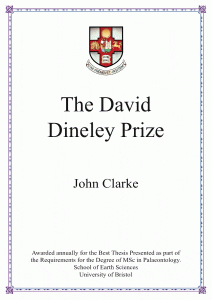 Launched in 2010, the David Dineley Prize is awarded to the best Masters student project each year. The prize recognises the project that best represents the ideals of the Bristol palaeobiology programme – it should be innovative, well planned, and well presented. The prize winner is identified by the staff, and with recommendations from the external examiner of the programme.
Launched in 2010, the David Dineley Prize is awarded to the best Masters student project each year. The prize recognises the project that best represents the ideals of the Bristol palaeobiology programme – it should be innovative, well planned, and well presented. The prize winner is identified by the staff, and with recommendations from the external examiner of the programme.
The prize honours Professor David Dineley (1927-2022), distinguished Bristol palaeontologist, who was a member of staff in the Department of Earth Sciences (= Department of Geology then) from 1968 to 1989, and was Chaning Wills Professor and Head of Department from 1968 to 1989. David Dineley is best known for his fundamental work on early fossil fishes and on Devonian stratigraphy, on which he wrote many scientific papers ands books. After he retired in 1990, Professor Dineley has continued his researches on the Devonian and its fishes, as well as writing and editing a number of geological books. There’s a more detailed biography here.
The first prize was awarded in early 2011, to the best project from the 2009-2010 cohort, and it has been presented annually thereafter.
Recipients
 2023-24: Matthew Adcroft for his project “Palaeoenvironmental change in the South Aegean across the latest Messinian and Early Pliocene: insights from molecular fossils and major and trace elements”.
2023-24: Matthew Adcroft for his project “Palaeoenvironmental change in the South Aegean across the latest Messinian and Early Pliocene: insights from molecular fossils and major and trace elements”.- 2022-23: Awarded jointly to Sidney Leedham for her project “Range of motion and myology support a digging function for the forelimbs of the alvarezsauroids Mononykus and Bannykus” and Morgan Jones for his project “Can minimal sets of broadly sampled loci produce informative avian megaphylogenies?”.
- 2021-22: Tim Rock for his project “Crown bird mandibular disparity is driven by dietary diversity, not adaptive niche partitioning”, supervised by Phil Donoghue, Emily Rayfield and Will Deakin.
- 2020-2021: Thomas Farrell for his project on “New ecdysozoan worms from the Sirius Passet Lagerstätte and their implications for the evolutionary history of Ecdysozoa”, supervised by Jakob Vinther.
- 2019-2020: Billie Jones for her project on “Locomotor divergence in Macropodoidea: Protemnodon was not a giant hopping kangaroo”, supervised by Christine Janis and Emily Rayfield.
- 2018-2019: Oliver Demuth for his project on “Biomechanics of the stem archosaur Euparkeria and implications for the posture evolution within Archosauria”, supervised by Emily Rayfield and John Hutchinson (Royal Veterinary College, London).
- 2017-2018: Jodie Murphy for her project on “The distribution of homoplasy in morphological datasets”, supervised by Davide Pisani and Phil Donoghue.
- 2016-2017: Neil Adams for his project on “Anatomy and function of a multituberculate skull”, supervised by Emily Rayfield, Phil Cox (York), Sam Cobb (York), and Ian Corfe (Helsinki).
- 2015-2016: Karina Vanadzina for her project on “The complex interplay of ontogeny and environmental factors during a transition in Globorotalia plesiotumida – tumidalineage of planktic foraminifera”, supervised by Dani Schmidt.
- 2014-2015: Robert Brocklehurst for his project on “Comparative biomechanics of biting versus suction-feeding fish”, supervised by Emily Rayfield and Laura Porro.
- 2013-2014: Elis Newham, for his project on “Can Morganucodon offer a window onto early mammalian physiology”, supervised by Pam Gill and Emily Rayfield.
- 2012-2013: Caitlin Colleary, for her project on “Statistical and mass spectrometric approaches to melanin taphonomy”, supervised by Jakob Vinther.
- 2011-2012: Mark Puttick, for his project on “Comparative phylogenetics of Anseriformes”, supervised by Mike Benton and Gavin Thomas (Sheffield).
- 2010-2011: Thomas Halliday, for his project on “A re-evaluation of goniopholidid material from Central Asia: biogeographic and phylogenetic implications,” supervised by Mike Benton and Marco Andrade (São Paulo).
- 2009-2010: John Clarke, for his project on “Establishing a timescale for plant evolution: palaeontological evidence and calibration consistency,” supervised by Phil Donoghue and Rachel Warnock.

